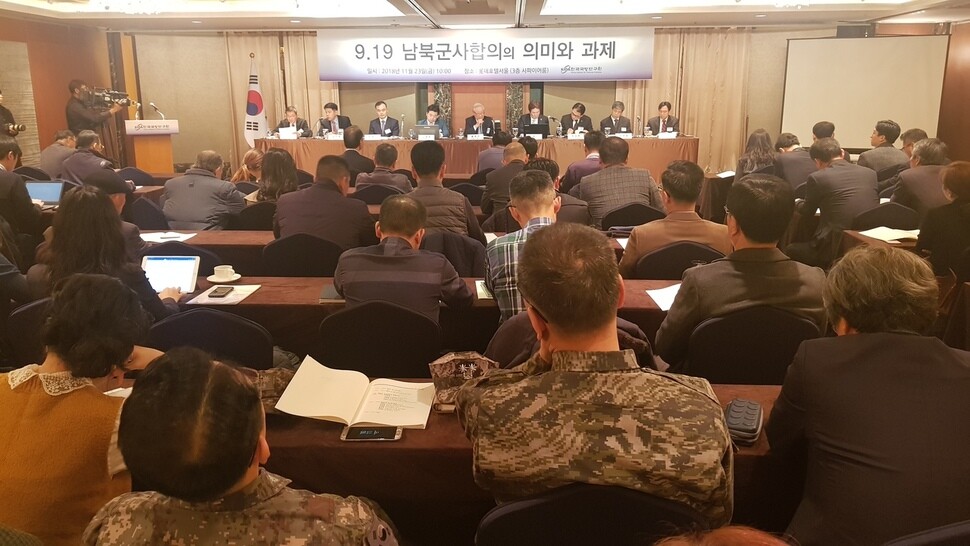hankyoreh
Links to other country sites 다른 나라 사이트 링크
Military experts caution against politicization of Comprehensive Military Agreement

During a seminar titled “The Sept. 19 Comprehensive Military Agreement: Its Significance and Challenges” that was held at the Lotte Hotel in Seoul on Nov. 23 by the Korea Institute for Defense Analyses (KIDA), multiple experts on military affairs warned against over-the-top political bashing of the military agreement as representing capitulation to North Korea. Even on a military level, experts repeatedly emphasized, the comprehensive military agreement (CMA) would have a negligible impact on the South Korean military’s readiness.
Friday’s seminar was hosted by Hwang Byeong-mu, professor emeritus at the Korea National Defense University. During a presentation in the seminar, Kim Yeong-jun, a professor at the Graduate School of Security Affairs at the Korea National Defense University, said that “the military agreement reached by South and North Korea on Sept. 19 is a military confidence-building measure designed to minimize the possibility of unintended conflict” and argued that “making indiscriminate criticism without offering a policy alternative is unproductive and serves to politicize discourse.”
Ahn Gwang-su, head of KIDA’s Center for Research in Military Affairs and Development, addressed the CMA’s suspension of maritime gunnery and mobility exercises. “North Korea has between three and five times as many forces positioned in the areas in question. Reducing this threat is more beneficial for us,” Ahn said.
Removing GPs has effect of pushing North Korean border back by 2km
Ahn also brought up the demolition of guard posts in the DMZ. “Since the security operations carried out by North Korea are based on manpower, removing the guard posts has the effect of pushing the North Korean border back by 2km,” he said.
“In light of the capabilities of South Korea and US reconnaissance assets, the establishment of a no-fly zone will have a minimal effect [on our reconnaissance activities] while placing considerable restrictions on North Korea’s reconnaissance activities,” Ahn said.
“Since South and North Korea have no disagreement about the Northern Limit Line in the waters to the east of Yeonpyeong Island, it’s appropriate to set up a peace zone and joint fishery there on a trial basis,” Ahn also suggested.
“It’s true that this also contains negative elements such as measures that limit the operation of military assets even though not enough trust has formed between South and North Korea,” said Mun Seong-uk, head of the Unification Strategy Center at the Korea Research Institute for National Strategy, who was a participant in the seminar. Moon called for “meticulous verification that North Korea is implementing the agreement and the establishment of contingency plans.”
By Yoo Kang-moon, senior staff writer
Please direct comments or questions to [english@hani.co.kr]

Editorial・opinion
![[Column] Has Korea, too, crossed the Rubicon on China? [Column] Has Korea, too, crossed the Rubicon on China?](https://flexible.img.hani.co.kr/flexible/normal/500/300/imgdb/original/2024/0419/9317135153409185.jpg) [Column] Has Korea, too, crossed the Rubicon on China?
[Column] Has Korea, too, crossed the Rubicon on China?![[Correspondent’s column] In Japan’s alliance with US, echoes of its past alliances with UK [Correspondent’s column] In Japan’s alliance with US, echoes of its past alliances with UK](https://flexible.img.hani.co.kr/flexible/normal/500/300/imgdb/original/2024/0419/2317135166563519.jpg) [Correspondent’s column] In Japan’s alliance with US, echoes of its past alliances with UK
[Correspondent’s column] In Japan’s alliance with US, echoes of its past alliances with UK- [Editorial] Does Yoon think the Korean public is wrong?
- [Editorial] As it bolsters its alliance with US, Japan must be accountable for past
- [Guest essay] Amending the Constitution is Yoon’s key to leaving office in public’s good graces
- [Editorial] 10 years on, lessons of Sewol tragedy must never be forgotten
- [Column] A death blow to Korea’s prosecutor politics
- [Correspondent’s column] The US and the end of Japanese pacifism
- [Guest essay] How Korea turned its trainee doctors into monsters
- [Guest essay] As someone who helped forge Seoul-Moscow ties, their status today troubles me
Most viewed articles
- 1[Column] The clock is ticking for Korea’s first lady
- 2After 2 months of delayed, denied medical care, Koreans worry worst may be yet to come
- 3[Column] Has Korea, too, crossed the Rubicon on China?
- 4US overtakes China as Korea’s top export market, prompting trade sanction jitters
- 5[Correspondent’s column] In Japan’s alliance with US, echoes of its past alliances with UK
- 6Hong Se-hwa, voice for tolerance whose memoir of exile touched a chord, dies at 76
- 7All eyes on Xiaomi after it pulls off EV that Apple couldn’t
- 8[News analysis] After elections, prosecutorial reform will likely make legislative agenda
- 9More South Koreans, particularly the young, are leaving their religions
- 10John Linton, descendant of US missionaries and naturalized Korean citizen, to lead PPP’s reform effo